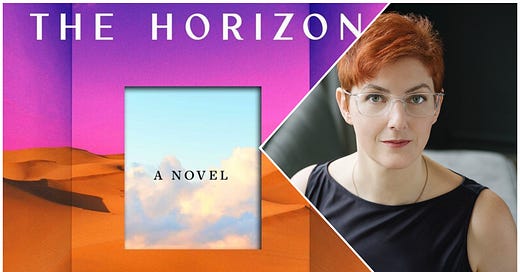Behind the book: 2025's first great AI novel
“Tech leaders aren’t going to like a true AI’s answer to the trolley problem." Erika Swyler and Loan Le on WE LIVED ON THE HORIZON.
I first discovered Erika Swyler because of her third novel, Light from Other Stars, an intimate and nuanced look at an astronaut’s interior life aboard an interstellar spacecraft. Her new book, a stunning literary sci-fi murder mystery called We Lived on the Horizon, hits bookshelves today, January 14, 2025.
Books about AI are flooding Edelweiss this year, but Swyler’s novel is a prescient and masterfully written exploration of the costs of technologies that are powerful enough to change cultures. In the walled city of Bulwark, a last bastion of civilization in a desert ravaged by apocalypse, Enita Malovis is building a body for Nix, her household AI, when she discovers that the murder of one of her wealthy peers has been seemingly erased from the memory of Parallax, the city’s own AI. The plot escalates and compounds from there, but I won’t give anything else away.
For the Frontlist, I spoke with Swyler and her editor at Atria Books, Loan Le, about bringing We Lived on the Horizon to life. A quick disclaimer: Erika and I share an agency (Trellis) and a publisher (Atria/One Signal Publishers).
Erika Swyler
What was the original seed idea for this book that captivated you?
While driving some years back, I listened to a piece about altruism on NPR. It was specifically about altruists of the extreme variety: people who donate kidneys to strangers. It’s something they’ve revisited on a few occasions. At that time, I was feeling real anger around political upheaval in the US and what it meant for everyone. I started thinking about the way governments rely on and even exploit altruists to keep societies functioning.
Around that same time, public interest in Large Language Models and AI was picking up, and that got me wondering what altruism might look like to a machine consciousness, and how that might be exploited. I kept thinking, “Tech leaders aren’t going to like a true Artificial Intelligence’s answer to the trolley problem.” That led me to want to pick at who is capable of doing good for others, and how that plays out in stratified societies. So, anger, and an interesting NPR story are to blame. Oddly enough, every time I start a project from a place of real anger, I end up in a place of deep caring.
What was the hardest part about writing this book?
It took a long time and several drafts to settle on how to write Nix’s voice. As an AI, they needed to think in a way that wasn’t human but was approachable, if not relatable. I focused on how machines and networks work, all those things that are so different from human thought and communication. I had to find a way to create that without alienating readers.
At one point I’d built a whole machine religion that dictated social structure among the book’s computer systems. Ultimately, I knew that was too much, and that Nix themself needed to do the lifting. I settled on using colors as a layer in their communication. It touched on synesthesia, but also instantly signaled a different kind of thought process.
I wound up relying pretty heavily on style choices in a way I hadn’t anticipated. Nix’s chapters are in the present tense because their experience of time is different. They’re a plural voice because their thinking and consciousness is plural.
We Lived on the Horizon earned starred reviews from PW, Kirkus, and Bookpage. What impact does that make on you as we approach pub day?
These are some of the kindest reviews I’ve ever received, so I feel quite lucky. It’s shock and a relief, to be sure. My creative process is solitary, so it’s hard to know if I’m touching on something readers need, or if I wrote a book that only I can enjoy. When a great review hits, it opens up that door just a crack to the possibility that a book isn’t a flight of fancy, but a needed story.
It’s hard to process praise, perhaps even more difficult than processing negative feedback. As writers, we steel ourselves for rejection, harsh comments, and all the weird friction points that happen if a book reaches outside its intended audience. There’s very little preparation for when things go right. So, I find myself a little shaky, a lot scared, but already profoundly grateful.
Loan Le, editor at Atria Books
What drew you to Erika's writing in general and to this manuscript in particular?
I have followed Erika's career since The Book of Speculation. I loved Light From Other Stars, and I was always vocal about my love for Erika. The manuscript landed in my mailbox, and I couldn't put it down. The language drew me in first — I can call it sophisticated, smart, gripping, etc., but I also think it's specific. Erika thinks about every word in her sentences, and it's as if these words only exist in and for this book. I had no trouble picturing Bulwark, Nix, and the details of Enita’s house, even though they don't exist here and now.
What made We Lived on the Horizon a great fit for Atria Books?
Overall, I think Atria Books is associated with book club novels. You have to talk to someone about the book. While this is more in the spec-fic/sci-fi territory, its themes and topics — AI, for example — are perfect for book clubs.
How did the book evolve during the editing process?
Honestly, I don't think we changed it that much! Style-wise, I had no reason to touch it! Erika's just that good. I might have asked her to elaborate on details about Bulwark and Parallax so that readers can feel more grounded. I loved Enita and Nix's relationship so much that I wanted more in the novel. I hope Erika thought the process was painless.
Forthcoming in The Frontlist
My most anticipated books of the year
More Behind the Books






